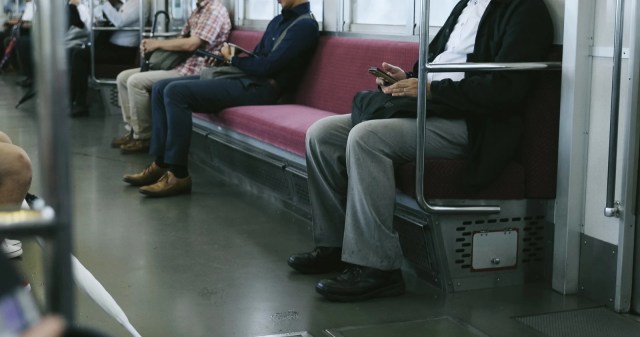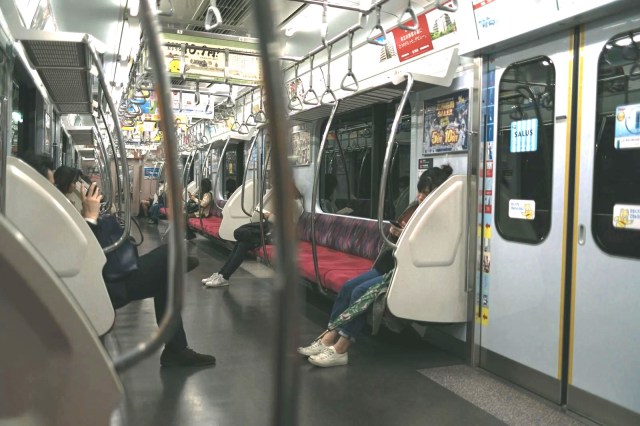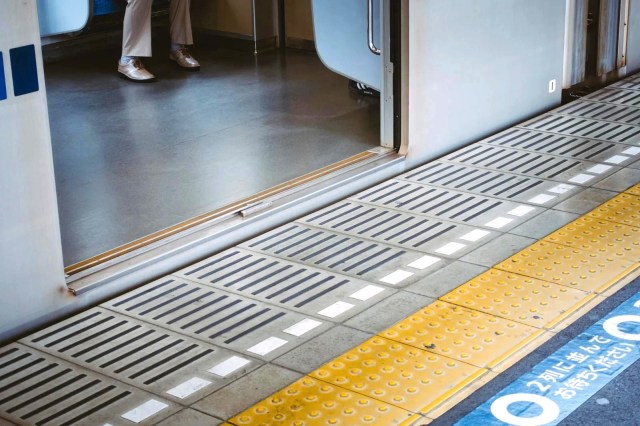
Participants pick the most unpleasant parts of public transportation.
Good manners and an amazingly convenient public transportation network are two of Japan’s biggest claims to fame. Unfortunately, sometimes those two aspects of Japanese society don’t perfectly overlap, with breaches in train/subway etiquette making what should be a smooth ride an unpleasant journey.
The Japan Private Railway Association conducts an annual survey on the manners of train and station users, asking respondents what behavior they find inconsiderate and aggravating. For this year’s survey, conducted through the association’s website, 8,210 responses were collected, with each participant asked to pick the three most impolite behaviors they’ve encountered, and at the top of the list was sitting impolitely, picked by 37.1 percent of respondents.
In particular, train passengers spreading their legs wide or stretching their feet out far in front of themselves were cited as impolite. Japanese trains generally have wide bench seats which are designed for a set number of passengers, sometimes even with upholstery patterns serving as visual markers of how much space each individual is supposed to take up. Spreading your legs out wider than that, therefore, is seen as encroaching on someone else’s space, and stretching your legs out too far in front of where you’re sitting cuts into the room where passengers who weren’t lucky enough to grab a seat have to stand, as well as creating an obstacle for those trying to board or get off the carriage. Some participants also expressed annoyance at passengers who take naps while seated and then, as they’re dozing end up leaning into their bench neighbor’s personal space or using their shoulder as a pillow.
In second place, chosen by 33.5 percent of respondents, were people who don’t cover their mouths while coughing or sneezing. This is something train passengers are increasingly aware of since the coronavirus pandemic, and also likely picked up a few extra votes by nature of the survey being conducted in October and November, when flu season is approaching and also the time of year when windows are increasingly shut on trains, which keeps the interior warm but also limits ventilation of airborne germs.
And in third place, chosen by 31.3 percent of respondents, are poor manners when boarding/exiting the train, or when others are doing so. To clarify that wide-ranging complaint, if you’re waiting on the platform for a train, good manners dictate that you should stand to the side of where the door opens and wait for any passengers to get off before you yourself board, even if that reduces your chance of snagging an empty seat once you’re onboard. On the other side of the situation, if you’re already on a crowded train and standing near the door (often the least crowded place to stand), when the train comes to the next station, even if you’re continuing on to somewhere further down the line, you’re supposed to step out of the train to clear the door passage for anyone who is getting off there, and then reboard the train. This also connects to the rule about not standing right in front of the doors if you’re waiting on the platform, since you need to not only leave space for anyone who’s getting off and leaving the station, but also a spot for anyone to stand who’s only temporarily getting off and going to reboard.
In general, Japanese etiquette sees being calm and non-confrontational as a virtue, so even if you happen to inadvertently commit any of these faux pas, you’re unlikely to have anyone yell at you or otherwise angrily try to correct you, especially if you look like a visitor from overseas. On the other hand, the fact that no one is going to call you out for these things makes it all the more important to be aware of them yourself and avoid them, so that everyone can enjoy the ride.
Source: Japan Private Railway Association via Norimono News via Livedoor News via Jin
Top image: Pakutaso
Insert images: Pakutaso (1, 2)
● Want to hear about SoraNews24’s latest articles as soon as they’re published? Follow us on Facebook and Twitter!



 We channel Sen from Ghibli’s Spirited Away and travel to a Japanese train station by the sea
We channel Sen from Ghibli’s Spirited Away and travel to a Japanese train station by the sea Japan Travel: What it’s like to go on a solo journey on a Japanese restaurant train
Japan Travel: What it’s like to go on a solo journey on a Japanese restaurant train Rules of tea, business cards, and bowing – 10 Japanese business manners young people are tired of
Rules of tea, business cards, and bowing – 10 Japanese business manners young people are tired of Disturbing video shows man hitting woman for crossing her legs on Japanese train【Video】
Disturbing video shows man hitting woman for crossing her legs on Japanese train【Video】 Japan’s new difficult-to-drink-from beer glass protects your liver, but it’s a brutal experience
Japan’s new difficult-to-drink-from beer glass protects your liver, but it’s a brutal experience Demon Slayer: Kimetsu no Yaiba gets new roller coaster attractions and food at Universal Studios Japan
Demon Slayer: Kimetsu no Yaiba gets new roller coaster attractions and food at Universal Studios Japan How to order snacks on a Shinkansen bullet train in Japan
How to order snacks on a Shinkansen bullet train in Japan New samurai glasses are Japan’s latest weird must-have souvenir
New samurai glasses are Japan’s latest weird must-have souvenir Hello, cosmetics! Clinique teams up with Hello Kitty this summer for first-time collaboration
Hello, cosmetics! Clinique teams up with Hello Kitty this summer for first-time collaboration High-fashion Totoro cuddle purse is like an elegant stroll in the forest【Photos】
High-fashion Totoro cuddle purse is like an elegant stroll in the forest【Photos】 Burger King Japan suddenly adds Dr. Pepper and Dr. Pepper floats to its menu nationwide
Burger King Japan suddenly adds Dr. Pepper and Dr. Pepper floats to its menu nationwide New Nintendo Lego kit is a beautiful piece of moving pixel art of Mario and Yoshi【Photos】
New Nintendo Lego kit is a beautiful piece of moving pixel art of Mario and Yoshi【Photos】 Japan’s cooling body wipe sheets want to help you beat the heat, but which work and which don’t?
Japan’s cooling body wipe sheets want to help you beat the heat, but which work and which don’t? Nintendo history you can feel – Super NES, N64, and GameCube controllers become capsule toys
Nintendo history you can feel – Super NES, N64, and GameCube controllers become capsule toys “The most Delicious Cup Noodle in history” – Japan’s French Cup Noodle wins our heart【Taste test】
“The most Delicious Cup Noodle in history” – Japan’s French Cup Noodle wins our heart【Taste test】 Starbucks releases a cute Frappuccino and Unicorn Cake…but not in Japan
Starbucks releases a cute Frappuccino and Unicorn Cake…but not in Japan Kyoto Tower mascot termination reveals dark side behind cute Japanese characters
Kyoto Tower mascot termination reveals dark side behind cute Japanese characters McDonald’s Japan’s Soft Twist Tower: A phantom ice cream only sold at select branches
McDonald’s Japan’s Soft Twist Tower: A phantom ice cream only sold at select branches Yabai Ramen: What makes this Japanese ramen so dangerous?
Yabai Ramen: What makes this Japanese ramen so dangerous? Finally! Nintendo Japan expands Switch 8-bit controller sales to everybody, Online member or not
Finally! Nintendo Japan expands Switch 8-bit controller sales to everybody, Online member or not Japanese government wants to build luxury resorts in all national parks for foreign tourists
Japanese government wants to build luxury resorts in all national parks for foreign tourists To combat declining birth rate, Japan to begin offering “Breeding Visas” to foreigners
To combat declining birth rate, Japan to begin offering “Breeding Visas” to foreigners 10 things you should buy at 7-Eleven in Japan
10 things you should buy at 7-Eleven in Japan Studio Ghibli releases anime heroine cosplay dresses that are super comfy to wear
Studio Ghibli releases anime heroine cosplay dresses that are super comfy to wear Woman charged for driving suitcase without a license in Osaka
Woman charged for driving suitcase without a license in Osaka Studio Ghibli unveils My Neighbour Totoro miniature house model
Studio Ghibli unveils My Neighbour Totoro miniature house model Kyoto experiencing problems with foreign tourists not paying for bus fares, but not on purpose
Kyoto experiencing problems with foreign tourists not paying for bus fares, but not on purpose Fighting mild hunger with a Japanese soda that turns into jelly in the stomach【Taste test】
Fighting mild hunger with a Japanese soda that turns into jelly in the stomach【Taste test】 Studio Ghibli’s Howl’s Moving Castle tapestry unveiled in Japan for first time
Studio Ghibli’s Howl’s Moving Castle tapestry unveiled in Japan for first time McDonald’s new Happy Meals offer up cute and practical Sanrio lifestyle goods
McDonald’s new Happy Meals offer up cute and practical Sanrio lifestyle goods Sales of Japan’s most convenient train ticket/shopping payment cards suspended indefinitely
Sales of Japan’s most convenient train ticket/shopping payment cards suspended indefinitely Sold-out Studio Ghibli desktop humidifiers are back so Totoro can help you through the dry season
Sold-out Studio Ghibli desktop humidifiers are back so Totoro can help you through the dry season Japanese government to make first change to romanization spelling rules since the 1950s
Japanese government to make first change to romanization spelling rules since the 1950s Foreigner’s request for help in Tokyo makes us sad for the state of society
Foreigner’s request for help in Tokyo makes us sad for the state of society Ghibli founders Toshio Suzuki and Hayao Miyazaki contribute to Japanese whisky Totoro label design
Ghibli founders Toshio Suzuki and Hayao Miyazaki contribute to Japanese whisky Totoro label design Doraemon found buried at sea as scene from 1993 anime becomes real life【Photos】
Doraemon found buried at sea as scene from 1993 anime becomes real life【Photos】 Tokyo’s most famous Starbucks is closed
Tokyo’s most famous Starbucks is closed Princesses, fruits, and blacksmiths: Study reveals the 30 most unusual family names in Japan
Princesses, fruits, and blacksmiths: Study reveals the 30 most unusual family names in Japan Survey finds big gap in Japanese train passengers who want to sit next to someone of opposite sex
Survey finds big gap in Japanese train passengers who want to sit next to someone of opposite sex Huge price hike for Japan Rail Pass triggers huge drop in foreign travelers who’ll buy it【Survey】
Huge price hike for Japan Rail Pass triggers huge drop in foreign travelers who’ll buy it【Survey】 Nozomi Shinkansen bullet train abolishes low-priced unreserved tickets during peak travel seasons
Nozomi Shinkansen bullet train abolishes low-priced unreserved tickets during peak travel seasons New private rooms on Tokaido Shinkansen change the way we travel from Tokyo to Kyoto
New private rooms on Tokaido Shinkansen change the way we travel from Tokyo to Kyoto Inconsiderate commuter behavior in Korea – A photo guide
Inconsiderate commuter behavior in Korea – A photo guide Woman kills self jumping onto train tracks, delay causes conductor to jump off tracks at other station
Woman kills self jumping onto train tracks, delay causes conductor to jump off tracks at other station Man flips out on train after being confronted for his rude behavior【Video】
Man flips out on train after being confronted for his rude behavior【Video】 These are the 11 most crowded trains in Japan…and surprise! They’re all in the Tokyo area
These are the 11 most crowded trains in Japan…and surprise! They’re all in the Tokyo area Japan’s new luxury sightseeing train will show you part of the country most foreigners never see
Japan’s new luxury sightseeing train will show you part of the country most foreigners never see Osaka earthquake hits city during peak hour, passengers freed after trains suspended
Osaka earthquake hits city during peak hour, passengers freed after trains suspended Tokaido Shinkansen ending in-train food/drink sales for all non-first-class-passenger cars
Tokaido Shinkansen ending in-train food/drink sales for all non-first-class-passenger cars 10 types of people Japanese women hate sitting next to on public transportation【Video】
10 types of people Japanese women hate sitting next to on public transportation【Video】 Can you guess where this amazing Japanese commuter train is hiding some extra seats? 【Video】
Can you guess where this amazing Japanese commuter train is hiding some extra seats? 【Video】 Is it OK to play with Pokémon card on the Shinkansen? A bullet train manners debate
Is it OK to play with Pokémon card on the Shinkansen? A bullet train manners debate Japanese train driver falls asleep while operating train
Japanese train driver falls asleep while operating train Chinese guy discovers way to get a seat on a busy train – fake seizures【Video】
Chinese guy discovers way to get a seat on a busy train – fake seizures【Video】
Leave a Reply